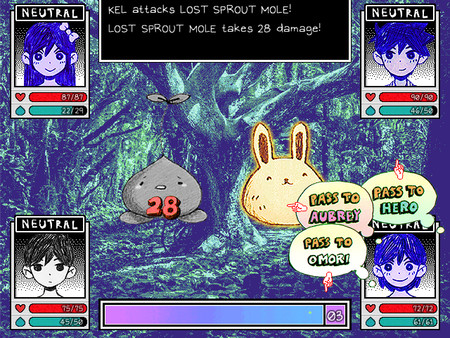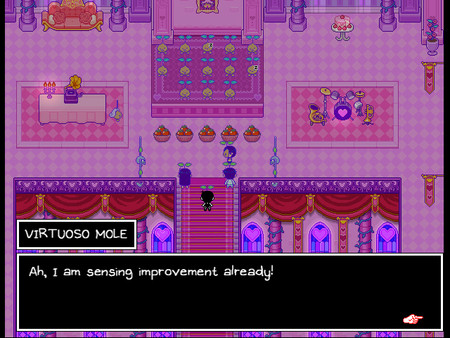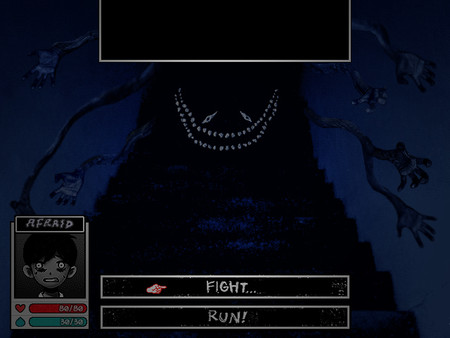OMORI is a critically acclaimed RPG game developed by OMOCAT released in 2020, taking inspiration from some of the bigger hits in the RPG world, inclucing titles such as Earthbound and Yume Nikki. It features psychological horror, with depictions of depression, anxiety and overcoming fears.

Mechanics:
OMORI features puzzles, battles and side quests in the overworld during navigation, which rewards the player with items, weapons and new skills to defeat tougher opponents.
Battles are turn-based, and opponents gradually become more tougher as the game progresses. A three-pointed emotion system is also introduced in battle, similar to that of Rock-Paper-Scissors.
Story:
Taking inspiration from the classic JRPGs, the player explores as OMORI along with three of his friends around the overworld, with the objective to find one of their friends who have mysteriously disappeared. As the story progresses, we learn more about the nature of HEADSPACE, the relations between the characters and the dark truth about the events and a forgotten past that occured in the story.

Aesthetics:
The three major sections of the game have different color palettes, with one area having bright, contrasting and vibrant colors to give the impression of a dream world or paradise, one area having more muted colors to give the impression of loneliness and represent reality and the last area being dark, intense and glitchy to induce horror, anxiety and represent the darker elements of the human subconscious. The color palette also has an influence on the battle screen and some of the overworld mechanics as well.
Some portions of the game also integrates photographs of real-world objects and integrating it into the visuals in a pythonesque style to create a sense of surrelism and disjunction from the overworld.

Technology:
The game was developed in RPG Maker and prominently features 2D sprites, hand-drawn graphics and a not so complicated AI for enemies, not requiring powerful graphics card to run. The simplicity suits the game style especially when combined with the more surreal aesthetics of the game, such as on-screen glitches and the usage of images of real-world objects.
Lenses:
- Curiosity: As the game progresses, the character’s dialogues slowly reveals bits and pieces of the storyline, which leads the user to connect the dots and keeps them on edge and making their own predictions about the past events, until the final reveal is depicted.
- Endogenous Value: The game has traditional RPG mechanics where OMORI and friends battle enemies and bosses throughout their exploration, with them being tougher as the game progresses. They give rewards such as in-game currency and experience points, where they can level up and learn new skills to fight tougher opponents, and to buy items for healing or to aid them in battle.
- Problem Solving: The battle mechanics include a three-pointed system with emotions as its theme, where it boosts or reduces the stats of either the characters or the enemies, including attack, defence, speed and luck. The player has to strategize with this mechanic to give themselves and edge over the enemies and bosses to win battles.
- Freedom: Like most RPG games, OMORI has a mostly linear storyline, but the player gets to have some degree of freedom in navigating around the overworld to explore, gain more experience and levels and perform side-quests in other areas before progressing on the main storyline. This enables the player to learn more about the story, and also enables every player to have a slightly different experience of the game from others.
Conclusion:
When I played the game in January 2021, I was just recovering from the experience of loss in my life. I had played games like Undertale and thought that OMORI would give off a similar experience. Throughout my playthrough it was clear just how much love was poured into the game and all the characters, and how much attention to detail was made to create an exceptional experience for the players. The characters, setting and themes truly resonated with me, and I found myself laughing, crying, symphatizing and loving all the characters present in that world. OMORI is not just a game, but a medium to tell a story true to its themes of adolescence, loss and overcoming fears, as well as inspire the player with its iconic and thematic question: “Waiting for something to happen?”
